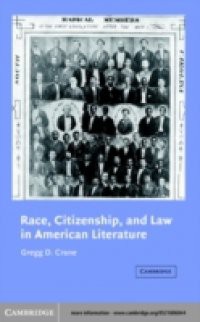In this broad ranging and powerful study, Gregg Crane examines the interaction between civic identity, race and justice in American law and literature. Crane recounts the efforts of literary and legal figures to bring the nation's law into line with the moral consensus that slavery and racial oppression were evil. By documenting an actual historical interaction central both to American literature and American constitutional law, Crane reveals the influence of literature on the constitutional discourse of citizenship. Covering such writers as Harriet Beecher Stowe, Ralph Waldo Emerson and Frederick Douglass, and a whole range of novelists, poets, philosophers, politicians, lawyers and judges, this is a remarkable book, that will revise the relationship between race and nationalism in American literature.

